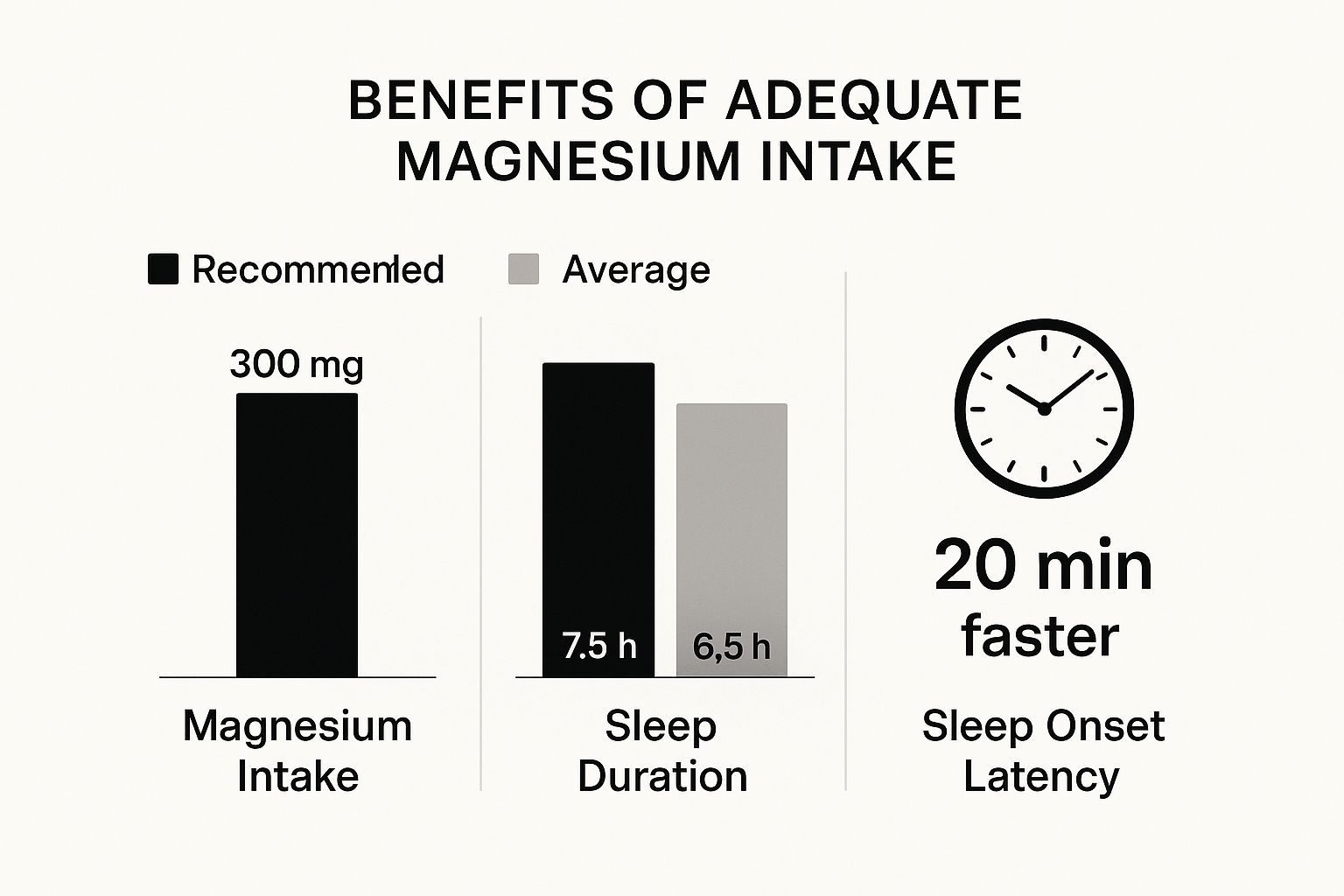The Fascinating Science Behind Magnesium and Sleep

Does magnesium help you sleep? Many people wonder about this connection. Understanding the science behind this essential mineral can help answer that question. Magnesium plays a vital role in numerous bodily functions, including nerve and muscle function, blood sugar control, and blood pressure regulation. It also turns out that magnesium is key for sleep regulation. This involves a complex interplay of neurotransmitters, hormones, and brain activity.
Magnesium's Role in Neurotransmitter Regulation
One of the primary ways magnesium impacts sleep is through GABA, a neurotransmitter. GABA promotes relaxation and reduces neuronal excitability. Think of GABA as your brain's "off switch." Magnesium helps GABA bind to its receptors more effectively, enhancing its calming effects.
This can lead to a more tranquil state of mind, making it easier to fall asleep and stay asleep. Additionally, magnesium helps regulate the stress hormone cortisol. Elevated cortisol levels can interfere with sleep onset and duration.
By modulating cortisol, magnesium contributes to a calmer internal environment that encourages better sleep. This is important because a racing mind, often fueled by stress, is a common barrier to restful sleep.
Magnesium and The Sleep-Wake Cycle
Magnesium is also involved in regulating the sleep-wake cycle, otherwise known as the circadian rhythm. This internal clock governs various physiological processes, including sleep and wakefulness. Magnesium helps this internal clock function properly, promoting healthy sleep patterns.
This means magnesium can be beneficial not just for falling asleep but also for keeping a consistent sleep schedule. Furthermore, research suggests a strong link between magnesium levels and overall sleep quality.
A 2022 systematic review found an association between magnesium and sleep quality, including daytime sleepiness, snoring, and sleep duration. This review emphasized magnesium’s potential benefits for various sleep-related outcomes. Magnesium is also a cofactor in many enzymatic reactions. It plays a role in the regulation of neurotransmitters like GABA, which promotes relaxation.
Magnesium can also mitigate stress responses and may even improve neuroplasticity, highlighting its importance to sleep health. As more people seek natural sleep solutions, magnesium supplementation is gaining attention. Learn more here.
Key Sleep Processes Influenced by Magnesium
To better understand how impactful magnesium can be, let's explore the table below. It summarizes the key sleep processes affected by magnesium and the potential benefits for your sleep.
| Sleep Process | Magnesium's Role | Potential Sleep Benefit |
|---|---|---|
| GABA Regulation | Enhances GABA's calming effects | Reduces anxiety and promotes relaxation, making it easier to fall asleep |
| Cortisol Modulation | Helps regulate cortisol levels | Minimizes the disruptive effects of stress on sleep |
| Circadian Rhythm Regulation | Supports proper function of the sleep-wake cycle | Promotes healthy, consistent sleep patterns and schedules |
These combined effects demonstrate why magnesium is so crucial for the overall structure of sleep, making it more than just a simple sleep supplement. This understanding of magnesium's wide-ranging influence on sleep helps us explore the research behind its potential benefits.
Does Magnesium Help You Sleep? What Research Really Shows
Many claim magnesium improves sleep, but is there any truth to it? This section delves into the scientific evidence supporting magnesium's potential sleep benefits, separating fact from fiction. We'll examine various research studies to understand how magnesium might impact your sleep.
How Magnesium Impacts Sleep Quality
Magnesium plays a vital role in several bodily processes that directly influence sleep. For instance, it affects sleep onset latency, which is the time it takes to fall asleep. Magnesium also encourages deeper, more restorative sleep, essential for waking up feeling refreshed and ready to take on the day.
The infographic below presents key data comparing magnesium intake and sleep outcomes. It illustrates the differences between recommended and average intake, sleep duration with and without sufficient magnesium, and its influence on how quickly you fall asleep.

As the infographic shows, adequate magnesium intake is associated with longer sleep duration and reduced sleep onset latency. This connection suggests a strong correlation between magnesium levels and healthy sleep. Research further supports these observations. A 2024 randomized double-blind placebo-controlled crossover pilot trial with 31 adults experiencing insomnia symptoms yielded promising results. Participants consuming 1g/day of magnesium demonstrated significant improvements in sleep quality, mood, and activity levels compared to those receiving a placebo. These improvements encompassed sleep duration, deep sleep, and sleep efficiency. You can explore the complete study here.
You might also find this interesting: The Neuroscience of Insomnia.
Magnesium's Influence on Sleep Architecture
Magnesium doesn't just help you drift off faster; it also enhances the architecture of your sleep. This refers to the different stages, including light sleep, deep sleep, and REM sleep. Magnesium's impact on GABA, a neurotransmitter that promotes relaxation, contributes significantly to these sleep-enhancing effects.
For some, magnesium supplementation leads to noticeable improvements in their sleep patterns. However, its effectiveness can vary, and it's not a universal solution. While addressing sleep, it's helpful to consider other factors influencing overall energy. Exploring the effects of natural energy boosters can offer additional insights. Even with adequate magnesium levels, other lifestyle factors can still affect sleep quality.
The following table summarizes key research on magnesium and sleep.
Key Research Studies on Magnesium and Sleep
This comparison table summarizes significant research studies examining magnesium's effects on sleep, including study design, participant demographics, dosages, and measured outcomes.
| Study | Participants | Magnesium Dosage | Duration | Key Findings |
|---|---|---|---|---|
| Randomized double-blind placebo-controlled crossover pilot trial (2024) | 31 adults with insomnia symptoms | 1g/day | N/A | Improved sleep quality, mood, and activity levels, including sleep duration, deep sleep, and efficiency |
This table highlights the positive impact of magnesium supplementation on various sleep parameters in individuals with insomnia. Further research is needed to explore the long-term effects and optimal dosages of magnesium for sleep improvement.
Choosing Your Perfect Magnesium Form for Better Sleep
Not all magnesium supplements are created equal when it comes to promoting restful sleep. The right form can make all the difference between waking up refreshed and enduring another night of tossing and turning. Understanding the different types of magnesium is key to optimizing your sleep.
Magnesium Glycinate: The Relaxation Specialist
Magnesium glycinate is often recommended for better sleep. It's bound to glycine, an amino acid known for its calming effects. Glycine helps with relaxation and reduces muscle tension, which can be beneficial for those experiencing restless legs or nighttime muscle cramps. This combination makes magnesium glycinate a powerful sleep aid.
Magnesium glycinate also boasts high bioavailability, meaning your body absorbs it efficiently. This increases the likelihood of experiencing its sleep-enhancing benefits. If you struggle with falling asleep or staying asleep, magnesium glycinate is a great starting point.
Magnesium Threonate: Brain-Boosting Benefits for Sleep
Magnesium threonate is another popular form for sleep support. It’s thought to cross the blood-brain barrier more effectively than other forms, directly impacting brain function related to sleep. Studies suggest potential benefits for sleep. A 2024 study highlighted Magnesium L-Threonate (MgT)'s effectiveness in improving both objective and subjective sleep metrics. Learn more about this research.
This targeted action on the brain may improve sleep quality and potentially even enhance cognitive function. Magnesium threonate might also be a good choice for those dealing with stress-related sleep difficulties. For additional tips on improving sleep, check out these science-backed tips for restful nights.
Forms to Approach With Caution
While many forms of magnesium offer potential sleep benefits, some are less ideal for those with digestive sensitivities. Magnesium oxide and magnesium citrate are readily available, but they’re known for their laxative effect. This can disrupt sleep. Choosing a gentler form like glycinate or threonate is typically a better approach for promoting restful sleep.

Master Your Magnesium Timing and Dosage for Sleep

The when and how much of magnesium supplementation can significantly impact your sleep. This section explores evidence-based strategies for optimizing your magnesium intake for better sleep. We'll also discuss why the recommended daily intake might not be enough for therapeutic sleep benefits.
Understanding Magnesium Dosage for Sleep
The recommended daily allowance (RDA) for magnesium often falls short of what sleep research suggests is needed for noticeable benefits. Factors like age, stress levels, and current medications influence your ideal dosage. This means a personalized approach is often best for optimal sleep improvements. Listening to your body and adjusting as needed is key.
For example, someone experiencing high stress might require a higher magnesium dose than someone with lower stress. Individuals taking certain medications might also need to adjust their magnesium intake to avoid interactions. Consulting a healthcare professional can provide personalized guidance for your specific situation.
Timing Your Magnesium Intake
The timing of magnesium supplementation plays a critical role in its effectiveness. While bedtime might seem intuitive, some individuals experience better results by taking magnesium earlier in the evening. This allows time for the magnesium to be absorbed and its calming effects to take hold.
Taking magnesium too close to bedtime can sometimes have a diuretic effect, potentially disrupting sleep. Experimenting with different timings can help you determine what works best for your body. Some people find that taking magnesium with an evening meal promotes better sleep.
Finding Your Ideal Magnesium Regimen
Finding the right magnesium regimen for sleep involves careful observation and adjustment. Start with the recommended dosage on your chosen supplement and gradually increase as needed, staying within safe limits. Note how you feel both before bed and upon waking.
-
Signs of a positive response: Improved sleep onset, fewer nighttime awakenings, feeling more rested upon waking, and reduced daytime sleepiness.
-
Signs you might need to adjust: Loose stools (a common side effect of magnesium) could indicate a need to reduce the dose or try a different form of magnesium.
If you experience any adverse effects, discontinue use and consult your doctor. Consistency is essential for magnesium to work effectively as part of a healthy sleep routine. Consistent intake allows your body to maintain optimal magnesium levels for sustained sleep benefits.
Food vs. Supplements: The Magnesium Sleep Showdown
Is your dinner plate more powerful than a supplement bottle for better sleep? This section explores the differences between getting magnesium through diet versus supplements, focusing on their impact on sleep quality. We'll also look at the best food sources of magnesium and how to incorporate them into your routine for more restful sleep.
Magnesium-Rich Foods for Sleep
Some foods contain bioavailable magnesium, meaning your body can easily absorb and use it. Leafy green vegetables like spinach and kale are excellent choices. Nuts, seeds, and legumes such as almonds, pumpkin seeds, and black beans also provide substantial amounts of this sleep-supporting mineral.
For example, a single ounce of almonds provides about 20% of your daily magnesium needs. Adding these foods to your diet can significantly improve your sleep. Keep in mind that how you combine foods can impact magnesium absorption.
Food Combinations That Help or Hinder Magnesium Absorption
Certain food pairings can either boost or block magnesium absorption. Combining magnesium-rich foods with foods high in Vitamin D, like fatty fish or fortified foods, can increase magnesium uptake. On the other hand, eating foods high in phytates, like whole grains and legumes, can hinder magnesium absorption.
This doesn't mean you should avoid these foods altogether. Soaking, sprouting, or fermenting grains and legumes can reduce phytate content, making magnesium more accessible to your body. Smart food combinations can maximize the magnesium you get from your diet.
Dietary Magnesium vs. Supplements: Which Is Right for You?
Some people see significant sleep improvements through diet alone. This is often true for individuals with mild magnesium deficiencies or those who haven't been focusing on magnesium-rich foods. Others, especially those with more severe deficiencies or specific sleep disorders, might need supplements.
Supplements offer a more concentrated dose of magnesium and can be helpful for targeting particular sleep problems. Choosing the right type of magnesium supplement is important. Check out our guide on Sleep, Insomnia Explained: 4 Causes, Solutions, and How to Find Relief Naturally for more holistic sleep tips.
Meal Planning for Magnesium-Boosted Sleep
Strategic meal planning can optimize magnesium intake throughout the day to support your natural circadian rhythm. A magnesium-rich breakfast, such as oatmeal with almonds and berries, is a great start. Include leafy greens in your lunch and dinner. A light, magnesium-focused snack before bed, like a handful of pumpkin seeds, can also be beneficial.
A magnesium-focused dietary plan creates a consistent intake to better support your sleep goals. If dietary changes aren't enough, supplements can be helpful. Everyone's needs differ. Pay attention to how your body responds and adjust your plan accordingly. Determining whether magnesium is right for you requires personal evaluation.
Are You the Perfect Candidate for Magnesium Sleep Benefits?
Magnesium is often touted for its sleep-enhancing properties, but its effectiveness varies from person to person. Understanding your individual factors can save you time and money. This section will help you determine if magnesium supplementation is right for you, using insights from sleep medicine specialists and nutritional biochemists.
Identifying Potential Magnesium Responders
Certain sleep problems and lifestyle factors may indicate a stronger response to magnesium. If you struggle with falling asleep or experience frequent nighttime awakenings, magnesium might be particularly beneficial. Individuals with high stress levels also often report that magnesium's calming effects promote better sleep.
Additionally, certain health conditions, like Type 2 diabetes and gastrointestinal disorders, can affect magnesium absorption. This can increase the likelihood of a deficiency. Addressing any underlying health concerns is essential for overall well-being and quality sleep.
Recognizing Signs of Low Magnesium
Subtle signs, like muscle cramps, restlessness, and anxiety, can sometimes suggest low magnesium. However, keep in mind that these symptoms aren't exclusive to magnesium deficiency and can have other causes.
Therefore, it's important to consider the overall picture. If you consistently experience these symptoms, discussing magnesium testing with your doctor is a good idea. They can determine if a deficiency contributes to your sleep issues.
Proceed With Caution: When to Seek Professional Guidance
While generally safe, magnesium supplementation requires extra caution in specific situations. Individuals with kidney disease or those taking certain medications like diuretics or antibiotics should consult their doctor before starting magnesium. This ensures safe and effective use.
Pregnant or breastfeeding women should also seek professional advice. A doctor can assess individual needs and recommend the appropriate magnesium dosage and form. For a comprehensive approach to sleep and well-being, check out The Stress, Sleep, and Pain Relief Bundle.
Magnesium isn't a miracle cure, but for the right person, it can be a valuable tool for better sleep. By understanding your individual needs and seeking professional advice, you can make informed decisions about using magnesium in your sleep routine. Explore our range of sleep-enhancing products at Aloha Relax, including 3D Bluetooth sleep masks and cooling silk pillowcases.

